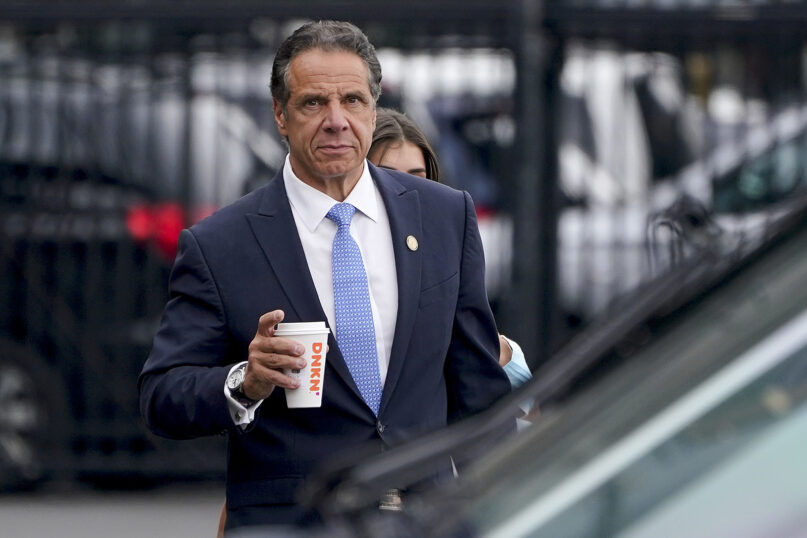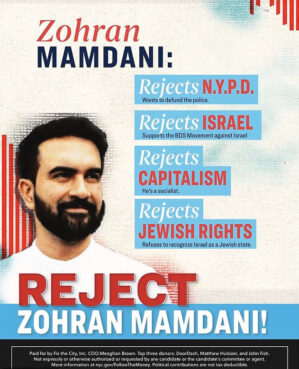NEW YORK (RNS) — On June 5, at the historic Cathedral of St. John the Divine, New York’s mayoral candidates were invited by an interfaith panel of religious leaders to discuss their visions for the city and its religious communities.
Only four candidates of the June 24 Democratic Primary had responded to the invitation — Jim Walden, Michael Blake, Scott Stringer and Zohran Kwame Mamdani, a 33-year-old state legislator and Muslim Indian immigrant whose core campaign issue was making New York a more affordable place to live. (Jim Walden is running as an independent.)
Asked about his plans to tackle religious divisions in the city, Mamdani discussed his own experience facing Islamophobia after 9/11. “It’s a fear that I remember all too well as a young Muslim man growing up in New York City. My aunt, who was a doctor and who wears a hijab, felt like she could not exist in public life anymore,” he said.
Mamdani, who would be New York’s first Muslim mayor, concluded by citing a verse from the New Testament. “We know that there is no room for this, and yet, too often, all we offer are our version of thoughts and prayers. It is time to actually act upon these beliefs, because we know from James 2:14 that ‘faith without works is dead.’”
RELATED: NY mayoral candidates address sanctuary, Trump and religious hatred at interfaith forum
While discreet about his Shia Muslim identity, Mandani has also appealed to New York’s religious communities by opening up about his faith, appearing in churches, synagogues, temples and mosques. It has earned the Democratic Socialist endorsements and sent a charge into the most religiously diverse city in the world.
But his identity has exacerbated the response to his pro-Palestinian stances that come with his Democratic Socialist Party’s platform. In a city riven by discord over Israel’s military campaign in Gaza following the Oct. 7, 2023, Hamas attacks, he has had to answer questions both about his support for Israel’s right to exist and accusations of antisemitism.
Mamdani has been unapologetic about his Muslim identity since he first ran to become a New York State Assembly member for Queens’ 36th district. Now in his third term, Mamdani has established strong ties with his district’s Muslim community, which spans Astoria and Long Island City.
The son of famed Indian-American filmmaker Mira Nair, Mamdani was born in Uganda and started school in South Africa before moving to the United States at 7 and becoming a U.S. citizen in 2018. His father, Mahmood Mamdani, is an Indian-Ugandan colonial studies professor at Columbia University.
A Shia Muslim, Mamdani follows the Twelver branch’s teachings, one of Shia Islam’s largest movements, whose adherents believe in the spiritual leadership of 12 prominent imams and await the return of Imam al-Mahdi. But Mamdani has appeared at Jummah prayer, Muslims’ congregational Friday prayers, at mosques of every stripe across the five boroughs.
Even non-Muslim candidates have reason to reach out to New York’s Muslim community, which has shown growing political power in recent City Council and State Assembly elections. But the community clearly sees Mamdani as one of their own.
His campaign platform, which includes strong support for rent control, has put him at the top of the polls citywide and naturally endears him to working-class Muslims. “He’s a candidate who is not only Muslim, but we also saw that he is centering everyday issues that everyday New Yorkers experience, like the increased cost of living,” said Mohamed Gula, a national organizing director at Emgage Action, which works to mobilize Muslim voters and has endorsed Mamdani’s campaign.
Combined with his outspokenness on the war in Gaza, Mamdani’s focus on kitchen table issues has drawn interest across the Muslim spectrum, Gula said. “In the immigrant Muslim community, you’ll find that foreign policy is very important as a driving factor for their vote. You can say the Black Muslim community will find that a lot of the domestic issues, like affordability of rent, affordability of food, a good quality of life, are a deciding factor for their vote,” he said.
But Waleed Shaheed, a senior Democratic strategist, said his campaign appeals to more than one immigrant community. “This has definitely not been a campaign about his Muslim identity at all,” said Shaheed, who points out that “issues of cost of living, affordability, rent, and public transportation” appeal to wide swaths of the city.
In campaign videos, he has addressed voters in Urdu, spoken by many South Asian Muslims, and in Spanish. The social media-savvy candidate also used his platform to raise awareness of issues faced by Muslim business owners.
In a January clip, the candidate denounced the long process to obtain permits for street vendors and its consequences on the price of Halal food truck plates. “New York is suffering from a crisis and it’s called Halalflation,” says the candidate in the video, standing across from a Halal food truck. “If I was the mayor, I’d be working with City Council from day one to make Halal eight bucks again.”
Gula said the challenge for Mamdani’s campaign is translating his popularity with Muslims into votes. Some 400,000 New York Muslims are registered to vote, but according to the Council on American-Islamic Relations, only 12% of Muslim voters showed up to the polls in the 2021 mayoral election.
“It’s really just a game of turnout at this point. … Because every conversation we’re having with Muslim voters, there hasn’t been a time where someone has said no,” said Gula.
Then there is the highly mobilized opposition. Shaheed said that Mamdani’s denunciation of the Israeli military campaign on Gaza has galvanized anti-war voters “who care about having our values at home align with our values abroad.” But, Mamdani’s repeated calls for a ceasefire in Gaza have irked some, and his reading of the conflict also put him under acute scrutiny.
He has refused to condemn such post-Oct. 7 slogans as “Globalize the Intifada” and “From the river to the sea, Palestine will be free,” two chants that are denounced by many as calls for Israel’s destruction.

FILE – New York Gov. Andrew Cuomo prepares to board a helicopter after announcing his resignation Aug. 10, 2021, in New York. (AP Photo/Seth Wenig)
In a podcast interview for the non-MAGA Republican outlet The Bulwark, Mamdani stressed that while the phrase was interpreted differently by many, he saw it as “a desperate desire for equality and equal rights in standing up for Palestinian human rights.”
Representative Dan Goldman, a Jewish Democrat from New York, responded sharply in a statement: “If Mr. Mamdani is unwilling to heed the request of major Jewish organizations to condemn this unquestionably antisemitic phrase, then he is unfit to lead a city with 1.3 million Jews.”
RELATED: Jewish voter network launches campaign to boost turnout in New York
At a June 4 televised debate, Mamdani was asked whether he would travel to Israel if elected mayor, a pilgrimage often made to appeal to New York’s Jewish voters. Mamdani argued that one “need not travel to Israel to stand up for Jewish New Yorkers, and that is what I will be doing as the mayor.”
The campaign of former New York Governor Andrew Cuomo denounced the comments as antisemitic. While some polls show Mamdani in first place ahead of Cuomo, a Marist poll released Wednesday (June 18) showed 38% of voters plan to rank Cuomo first in the ranked choice primary, followed by 27% for Mamdani.
Going further, one pro-Cuomo flyer depicted Mamdani with a darker and longer beard next to a message saying he rejected Israel and Jewish rights. Mamdani denounced the image as “blatant Islamophobia,” adding it to a list of other incidents that it claims attacked his religious background. (The Cuomo campaign said the flyer hadn’t been approved for distribution.)
“I think there is definitely a double standard when it comes to that. Our institutions, our political culture, don’t treat Islamophobia the same way it might treat other forms of bigotry,” said Shaheed.
On Thursday, the New York Police Department’s hate crime unit opened an investigation into bomb threats on the candidate’s car.
Some progressive Jewish groups have come out for Mamdani. Sophie Ellman-Golan, director of strategic communications at Jews for Racial & Economic Justice, said she has “never felt as hopeful about an election as she does this one.” Her organization has endorsed both Mamdani and Brad Lander, New York’s comptroller, who have also cross-endorsed each other.
“We need someone who has a bold vision, who genuinely believes in the public good, and will fiercely implement the tools of government to actually improve people’s lives,” said Ellman-Golan, adding that isolating faith-based wedge issues “obscures the fact” that Jewish New Yorkers have the same priorities as any other city residents.
“Jewish New Yorkers are also struggling to afford to stay here,” she said. “Jewish New Yorkers also take public transit. Jewish New Yorkers are also trying to figure out how to find childcare, and are also worried about increased crackdown from the federal government. Just like all other New Yorkers, Jews have an important role to play in this election.”

Bishop Matthew F. Heyd, right at pulpit, leads an interfaith forum with New York City mayoral candidates Scott Stringer, from left, Michael Blake, Jim Walden and Zohran Mamdani, Thursday, June 5, 2025, at St. John the Divine Cathedral in Manhattan. (RNS photo/Fiona André)
Meanwhile, Hindus, another faith group that is increasingly politically organized in New York, have shown up in support of Cuomo, sometimes solely based on the fact that he is not Mamdani. “Mamdani is actually a radical Islamist,” said Dinesh Mojumder, a Bangladeshi real estate businessman and founder of the Times Square Durga Puja. “That’s the main point. If they come, then this city will be under Sharia law, term by term.”
The American Hindu Coalition’s New York chapter has planned a canvassing event on June 22 at the Hindu Temple Society of North America, where Cuomo is set to make an appearance.
According to Mojumder and others in the Coalition, Mamdani has not helped his cause with Hindus by referring to Indian Prime Minister Narendra Modi, in an interview, as a “war criminal” and saying he’d bar the prime minister from hosting a rally in Madison Square Garden. Modi has long been excoriated by Muslims for his actions as governor of the Western Indian state of Gurjarat in 2004, when riots fomented by religious extremists killed scores of Muslims.
It’s Mamdani’s inability to recognize that there are two sides to every conflict, said Pankaj Mehta, the founder of Interfaith Human Rights Coalition, that has garnered the opposition of Hindus and Jews to his campaign.
“If the leaders don’t hold a certain standard of civility, how can we expect around the world that people who’ve been educated, indoctrinated, with hate to understand,” he said. “As an interfaith group, we want to see a candidate come and say that they are for all faiths, not selectively.”








